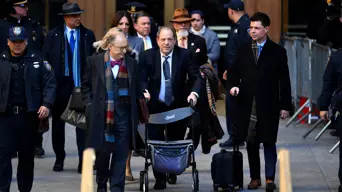New York court overturns Harvey Weinstein sex crime conviction
The ruling does not affect a separate 16-year rape sentence handed down in California - meaning the once-untouchable Hollywood heavyweight will remain behind bars.

FILE: Harvey Weinstein leaves the Manhattan Criminal Court, as a jury continues with deliberations on 21 February 2020, in New York City. New York's highest court on 25 April 2024, overturned Hollywood producer Weinstein's 2020 conviction on sex crime charges and ordered a new trial. Picture: Johannes EISELE / AFP
NEW YORK - New York's highest court on Thursday overturned disgraced Hollywood producer Harvey Weinstein's 2020 conviction on sex crime charges, a shock reversal in one of the defining cases of the #MeToo movement.
In its 4-3 decision, the Court of Appeals found the trial judge erred in admitting the testimony of additional women who were allegedly abused by Weinstein but who were not named in the charges brought against him, and ordered a new trial.
The ruling does not affect a separate 16-year rape sentence handed down in California - meaning the once-untouchable Hollywood heavyweight will remain behind bars.
"The accused has a right to be held to account only for the crime charged and, thus, allegations of prior bad acts may not be admitted against them for the sole purpose of establishing their propensity for criminality," Judge Jenny Rivera wrote in an opinion for the majority.
Bombshell allegations broke against the Oscar-winning producer in 2017, launching the #MeToo movement that paved the way for women to fight back against sexual violence in the workplace.
Weinstein, 72, was convicted in a New York court in 2020 of the rape and sexual assault of ex-actress Jessica Mann in 2013, and of forcibly performing oral sex on former production assistant Mimi Haleyi in 2006. He was later sentenced to 23 years in prison.
Weinstein, who has multiple health issues and is in an upstate New York prison, found out Thursday's news when handed a slip of paper that "just said 'Harvey Weinstein conviction reversed,'" his lawyer told reporters.
"He called me actually three times," Arthur Aidala, head of Weinstein's legal team, said. "He said 'thank you' more times than I can count."
Aidala said even unpopular people deserve justice, and "we knew that Harvey Weinstein did not get a fair trial."
The Silence Breakers, a group of women who banded together to report Weinstein's misconduct, called the decision "disheartening," adding "this ruling does not diminish the validity of our experiences or our truth."
Manhattan prosecutors said they plan to retry the case.
DOZENS OF ACCUSERS
Weinstein was also convicted by a Los Angeles court - and sentenced to an additional 16 years in prison - for the rape of a woman in a Beverly Hills hotel room.
Lawyers said his Los Angeles conviction was unlikely to be affected by the New York reversal, and he is now set to be transferred to a California prison.
"The legal system has never served survivors in this country," #MeToo founder Tarana Burke told reporters.
"Because these brave women in this case broke their silence, millions and millions and millions of others found the strength to come forward," she added. "That will always be the victory."
Following his conviction in New York, a civil trial awarded $17 million to dozens of other women who had accused the former movie magnate of abuse.
'PSYCHOLOGICAL TRAUMA'
"With today's decision, this Court continues to thwart the steady gains survivors of sexual violence have fought for in our criminal justice system," Judge Madeline Singas, who dissented against the ruling, said.
"Forgotten are the women who bear the psychological trauma of sexual violence and the scars of testifying again, and again."
The decision rested on the fact the trial judge allowed prosecutors to rely on so-called "Molineux witnesses," who were allowed to testify despite not being part of the charges - an exception to the normal rules surrounding evidence.
Attorney Douglas Wigdor, who represented two such witnesses, said: "The jury was instructed on the relevance of this testimony, and overturning the verdict is tragic in that it will require the victims to endure yet another trial."
Weinstein and his brother Bob co-founded Miramax Films, a distribution company named after their mother Miriam and father Max, in 1979. It was sold to Disney in 1993.
Their hits included 1998's Shakespeare in Love, for which Weinstein shared a best picture Oscar. Over the years, Weinstein's films received more than 300 Oscar nominations and 81 statuettes.